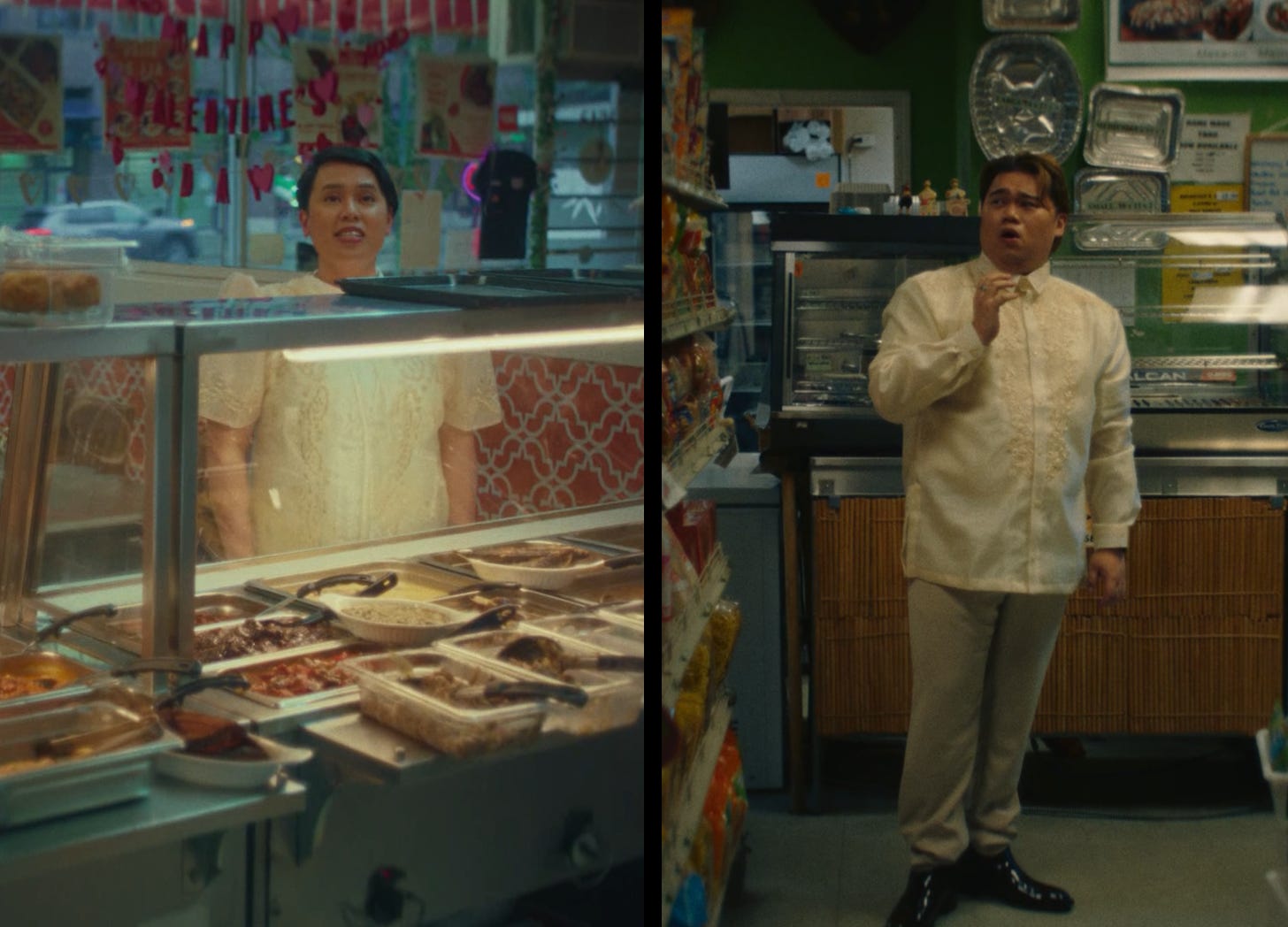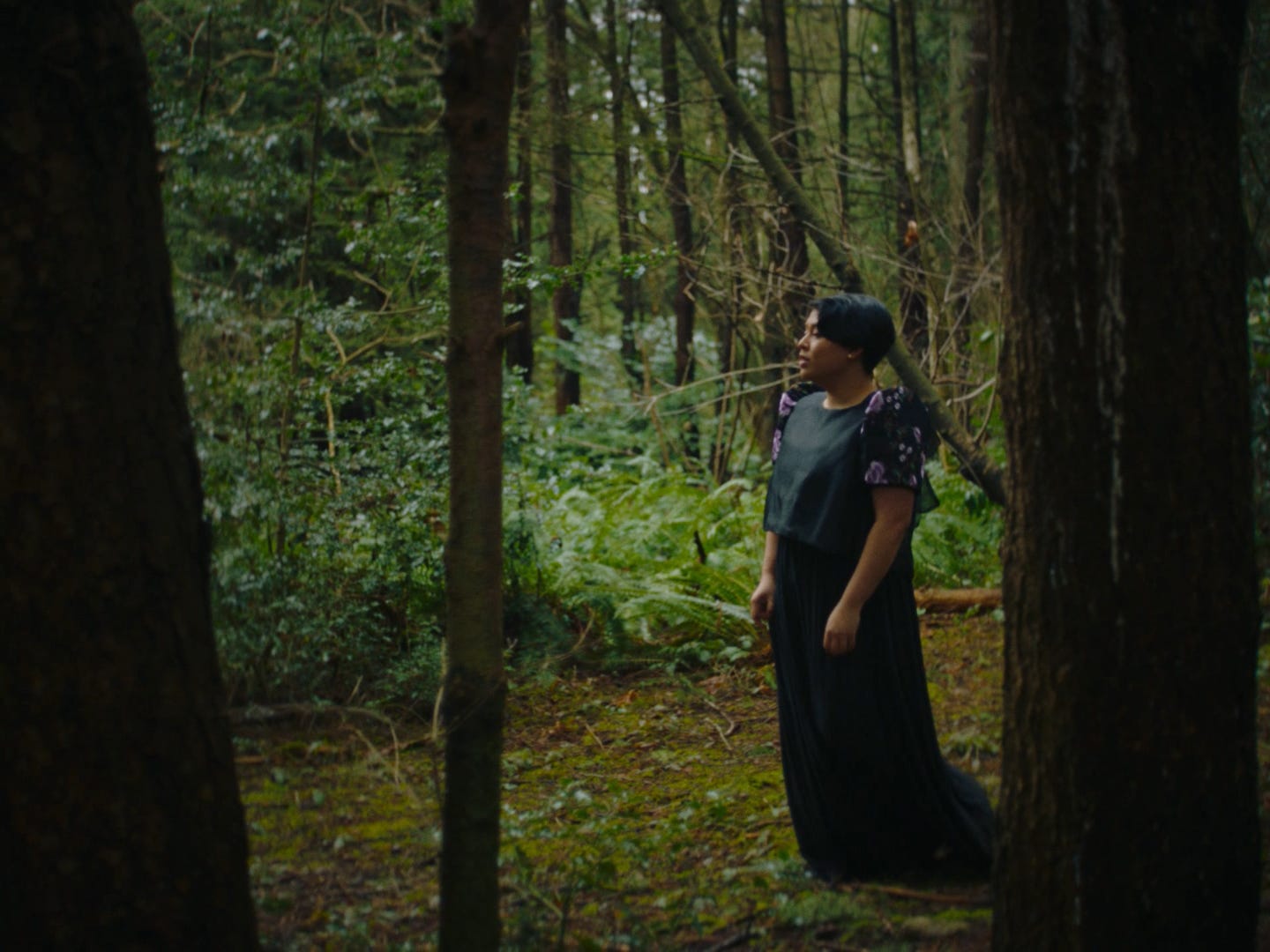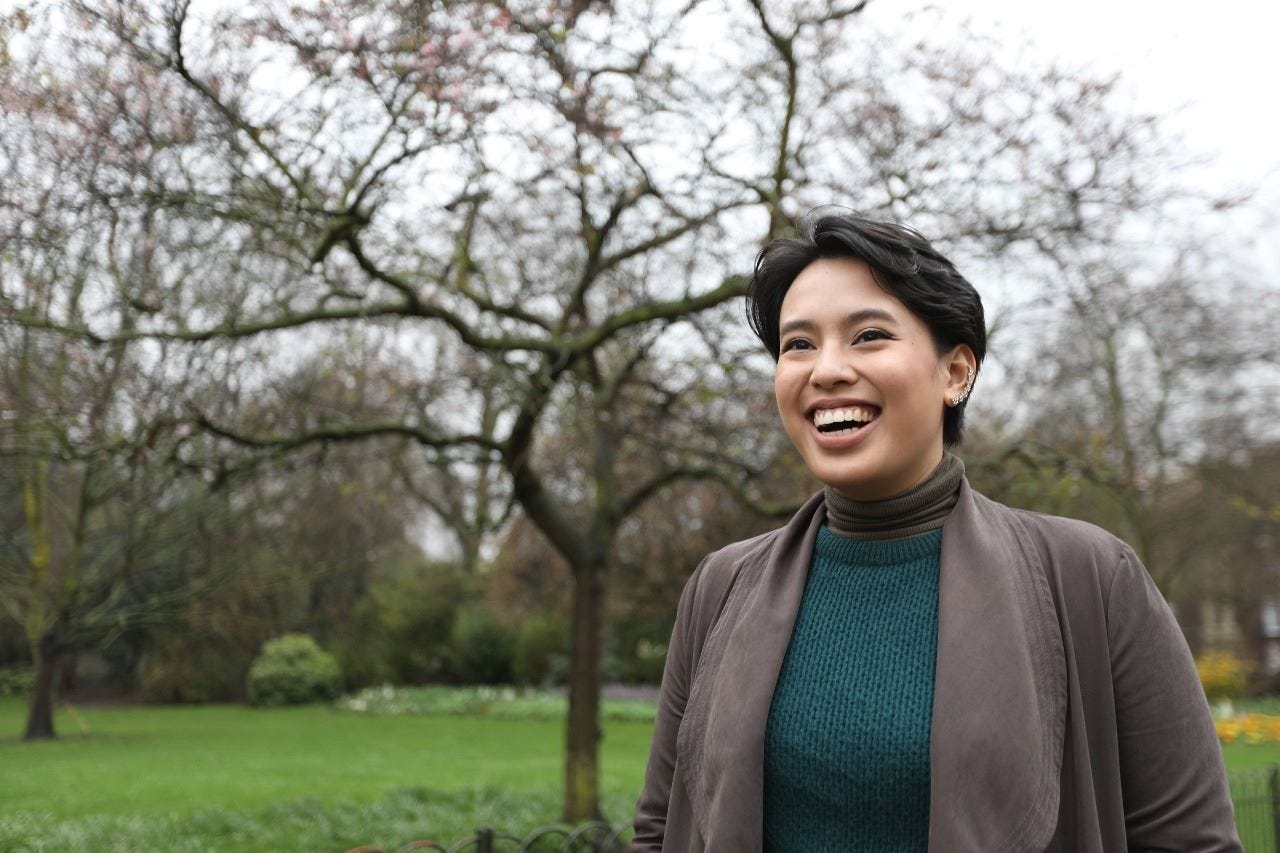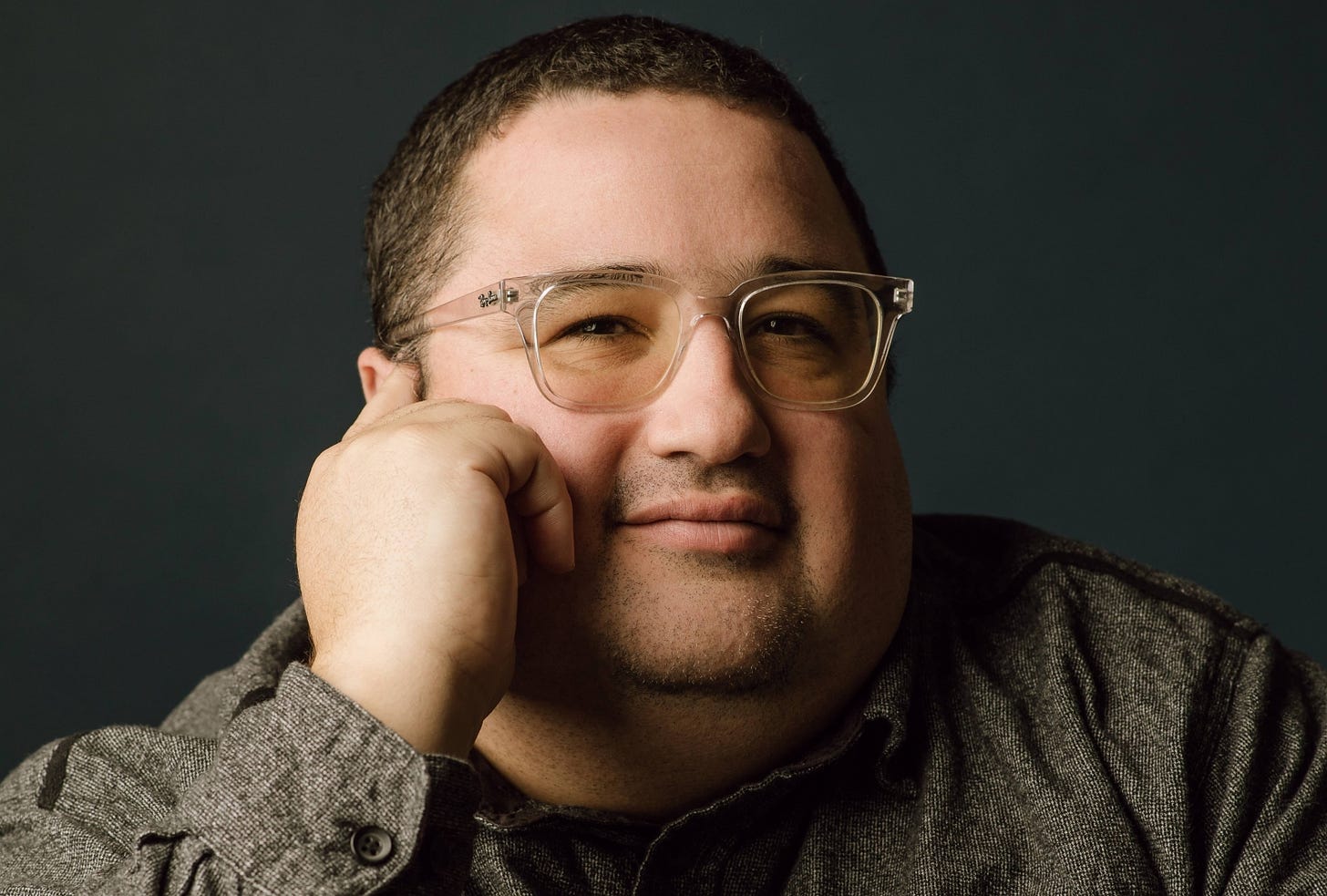Born in the Philippines. Sung in Canada. Felt Everywhere.
Blending Tagalog and English, film and song, 'Liham' gives voice to the Filipino-Canadian experience.
LISTEN TO THE EPISODE
You can download this podcast on all major platforms including Apple Podcasts and Spotify.
On Philippine Independence Day, June 12, a powerful new digital art piece takes center stage: Liham: A Digital Song Cycle. Composed by Juro Kim Feliz with poetry by Revan Badingham III, Liham (translation: Letter) is a four-part multimedia song cycle that doubles as a deeply personal memoir and a resonant love letter to the Filipino spirit.
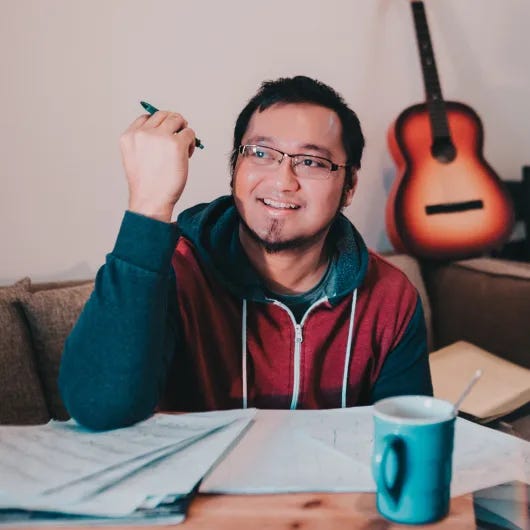
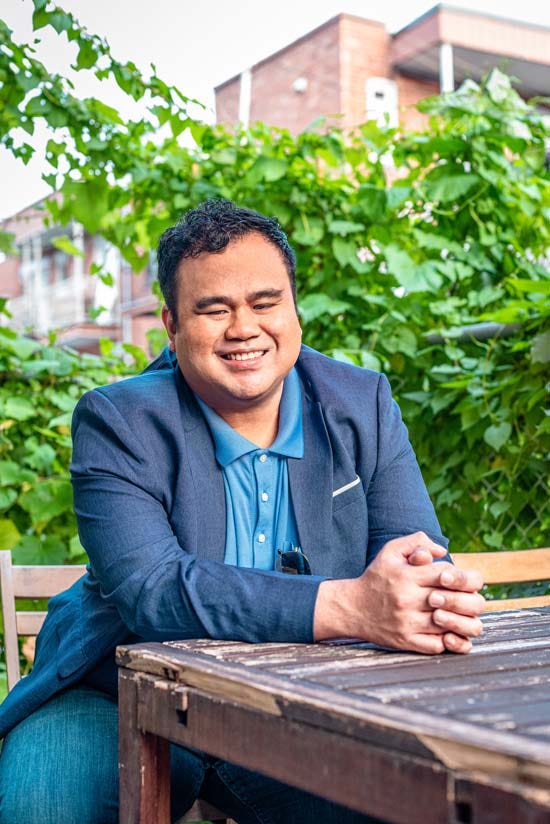
Commissioned and produced by Filipino opera artist and theatre-maker Renee Fajardo, Liham offers a poignant reflection on the many layers of Filipino-Canadian identity, migration, and community. Alongside the songs, the work features stories from four Filipino-Canadians—including two Filipino business owners in British Columbia who also opened their spaces as filming locations—highlighting lived experiences that span generations and geographies. It also features the stories of local Vancouver visual artist, Bert Monterona, and multi-award winning actor and singer Carolyn Fe.
"It was important to us to work with folks within our community here, and I wanted the project to tell their—our—stories, wherever that took us," Fajardo shares. "This is a love letter to those of us who, for one reason or another, know what it’s like to have a heart constantly between identities, between oceans."
Presented as a digital song cycle, Liham blends contemporary classical music, storytelling, poetry, and film. It challenges prevailing narratives by affirming the validity of diverse Filipino experiences—whether born in Canada, newly arrived, or long-settled—without reducing them to stereotypes or trauma.
Baritone Danlie Rae Acebuque and pianist Vivian Kwok also feature musical performances in this cycle. Film direction by Solara Thanh-Bình Đặng, cinematography by Rachel Chen, film editing by Josh Aries, and web design by Joey Laguio.
The project premieres at lihamproject.com on June 12, marking Philippine Independence Day and celebrating Philippine Heritage Month.
READ THE TRANSCRIPT
Renee Fajardo:
What is our identity now? Which even for Filipinos is a very hard question. To me though, it's like, well, we're a diaspora people. We also have a very potent, very beautiful homeland. We live in both. And I think that's the reality of having all of these kind of fragments of influences and music and things is trying to also encapsulate.
Ashley Daniel Foot:
We're Inside Vancouver Opera and I'm Ashley Daniel Foot. As we honour Filipino Heritage Month in June, this episode is really a tribute to the voices, past, present, and future, that shape our communities, our stages, and our stories. Today we're honoured to spotlight a powerful new musical work that speaks to the heart of the Filipino diaspora, Liham, a contemporary art song cycle for low voice and piano composed by Juro Kim Feliz with a libretto by Riley Palanca (alias: Revan Badingham III).
Conceived during the early days of the pandemic and recently filmed for digital release, Liham offers a poetic and political reflection on identity, migration, injustice, and resilience. The premiere, coming this June, will be accompanied by a dedicated website hosting community testimonials from Filipinos around the world.
Joining me today to talk about Liham are two remarkable artists at the centre of this project. First, Renee Fajardo—a Filipino mezzo-soprano, opera producer and theatre educator born and raised in Manila. Renee has performed on opera stages and is a solo recitalist across the Philippines, the UK, Europe and Canada. She's currently the education manager at Gateway Theatre and the artistic producer for Sound the Alarm: Music/Theatre.
And Danlie Rae Acebuque—a Filipino-Canadian baritone, originally from Iloilo City and now based in Toronto and is a graduate of the Yulanda M. Faris Young Artists Program right here at Vancouver Opera.
Renee, let’s start with the big question. What is Liham and how did this become a song cycle? Where did it all come to you?
Renee Fajardo:
It started from when I moved abroad, which was almost eight years ago. I'd grown up and lived in the Philippines all my life. But then moving abroad, I quickly found out that there's only a specific set of stories that get represented about Filipino people who are within the diaspora.
I always found it quite limiting because it's all it's usually to do with folks on the health care industry or child care industry. And those stories felt quite limited to me because I feel like Filipinos are everywhere. We do almost everything, if not everything. And so the idea to do a song cycle or any creative work really that told a broader story of what being Filipino means when you're abroad really appealed to me.
And so when I joined the digital version of the Banff Opera and during the pandemic time, there was an opportunity there with the mentors to kind of delve deep in stories and things that really resonated or were important to us. And it's through that program with Joel Ivany, Ian Cusson, and Cathy Daniel, I sort of started to really unearth that there could be a specific song cycle that allowed me to reach out to my own community, but also tell the stories or explore the stories that I was interested to find out.
Ashley Daniel Foot:
For those unfamiliar with Filipino music, what should they be listening for in this particular piece? And are there sounds or styles that feel especially rooted in home for you?
Renee Fajardo:
Quite a lot, actually. I feel like the thing that resonates a lot is the poetry to start, because a lot of this text is actually quite specific to a specific period of time. When Riley wrote the text for this cycle, it was, it was around the last elections that we had. So a lot of the text, while it depicts very specific images, it alludes to a lot of the administration.
I think the poetry really speaks to home. It's a situation that I never experienced personally because I was already abroad by that time, but it was the reality that was lived by my family and is currently also still being lived by my family.
But with the music, things that are about things that I've heard of while growing up, mean, Kundiman is very much quoted in Liham, so a lot of the traditional Filipino art songs are kind of fragmented and you get bursts of them, of these passages, that would be quite well known to someone who's familiar with Kundiman, but then you get a quick burst and then it's gone.
Ashley Daniel Foot:
So Danlie, when you first saw the score and you read the poetry, what stood out for you? Did it feel different from some of the other song cycles, I’m sure it did, that you usually perform?
Danlie Rae Acebuque:
What stood out most to me is that how they are really true to life in terms of how Riley wrote it. And not necessarily I'm saying that I'm experiencing the same thing as other Filipinos are experiencing in the Philippines, but there are some truths to it that I witness when I'm still in the Philippines that I feel like is being repeated.
And it's so interesting to see that on a piece of music like this, because we thought we corrected whatever was happening in the past. But the fact that it is still written and being told upon over and over again, it just made you realize, emotionally, that that it is still an ongoing situation. And when I was learning the piece, I cannot help myself but think of all the experiences that my fellow Filipinos had experienced when it comes to injustice system in the Philippines.
For example, in the third song, I related it to my mom when she arrived in Canada for the very first time and experiencing snow and travelling on a blizzard and just to get food to eat. And when she got me and my dad in 2011, when we first had our snow experience and we're literally, in the text of the song, we're walking like ducks on roads of ice. That is so true while we're carrying two sacks of jasmine rice. And I've never felt so connected to the piece because it's so tangible and it's so relatable to the listeners. And that's what strikes me with this piece.
Ashley Daniel Foot:
In one of the books that inspired the song cycle Letters of Transit: Reflections on Exile, Identity, Language, and Loss, Andre Aciman writes in' ‘shadow cities’ about where he once belonged but never settled. Does that idea of partial belonging resonate with you as a Filipino living and working here in Canada, Danlie?
Danlie Rae Acebuque:
Definitely. Definitely. I feel that I am seen in this industry, but I am partially heard. I feel like for Southeast Asian artists, I feel like we have to work 200x harder just to be seen in this particular art form. And I remember myself working hard when I was in university and like looking at who in Canadian stage, or who in the opera world, looks exactly like me.
There's so many other Asian people that are being represented but not me. And in order to do so, I have to work hard for it. And I am seen through my dedication to the art. But I feel like I am still not being accepted fully without doing something that is profound or without doing something that is over the limit of what I can do.
Being here in VO (Vancouver Opera), I feel like there's a sense of belonging now, when here in VO for me at least. And I feel like I am am seen and heard already in VO and I feel like I am part of it. But I feel like in general, I don't think that I am still there. I feel like I still have to open so many doors in order to get the same opportunity as everyone and I feel like I have to work so hard to get that opportunity.
Ashley Daniel Foot:
I’m wondering, Renee, just to turn over to you, what does it mean to see Filipino identity represented on stage in a classical context? Does it feel like reclaiming space?
Renee Fajardo:
It does, yeah. I mean, because the Philippines has been a heavily, heavily colonized country. In some ways, Western art forms already also feel like they're ours.
Ashley Daniel Foot:
How did that come to play out?
Renee Fajardo:
We were colonized by Spain for more than 300 years, and then became an American military base, and then were occupied by the Japanese during World War II.
Really the idea, without going too much into history, the idea of nationhood for the Philippines was only really born because there were foreign invaders coming into the country and then having to tell the indigenous peoples essentially that, “well, this is who you are now. This is because you all live here, then this is who you are.”
Really, up until that point, as far as I know, the Philippines was a collection of more than 7,000 islands and each had a different nation that occupied and lived in those islands. It's only when we were colonized that then we were branded, “Okay, this is your group of people and we are here to conquer you.” is what happened.
And so a lot of our ideas of what it means to be a nation as a whole is kind of borrowed in some sense. With that, coming out into the world with this lens of being colonized, our art forms started to also reflect the art forms of our colonizers. Western art form, think, is as much entrenched in Filipino culture as our older indigenous art forms and ways of life are.
Ashley Daniel Foot:
And Liham begins each song with a Tanaga. What does it mean to centre a language that has often been sidelined in classical music? And Eve Hoffman talks about losing her native language and describes it as a kind of amputation.
Renee Fajardo:
It's always extremely liberating to be able to speak your first language. English is also a national language in the Philippines. I’ll also say that. Most Filipinos will be able to speak English or understand English.
I don't know if viscerality is a word, but there's a different viscerality when one is able to express their thoughts and even poetry in their own language. So the fact that Riley starts each song with a Tanaga is part of that reclamation that you've brought up.
But for folks that don't listen to or don't understand Tagalog, it's a kind of calling out to like, “okay, listen to this, because this is something that's unfamiliar to you.” It's a little bit of a drawing of attention. And then the rest of the song goes into English and tells a slightly different story.
Ashley Daniel Foot:
Danlie, you sing about war, exile, longing. Is there a section in Liham that really challenged you, maybe vocally or emotionally, connected to your story, to your place?
Danlie Rae Acebuque:
I was telling Renee this when we were recording it at UBC and I told her, “I've never sung a contemporary piece this challenging vocally,” when I started singing the second piece. I was talking actually to the composer about this and I told him, I hate you for like writing this the way that you did. It's so challenging. It's jumping from one octave to another octave. There's a lot of leaps. There's a lot of accents, there's a lot of like screaming happening in this piece and I told him, “What's your inspiration in this piece?” And he literally just told me read the poem and then call me again and then I called him after and I said okay I understand now why!
Ashley Daniel Foot:
Do remember what the second poem was about?
Danlie Rae Acebuque:
That's the injustice part of the many killings that's been happening back in Duterte's time about the idea of the drug lords and the war on drugs. Talking about right now, it's giving me goosebumps because when you live in the Philippines, you only see the beauty of the place. But once you live there along, long time, like I did for like 15 years, you will see the ugly part of the Philippines.
My dad used to work as a public official in a small municipal order. We call it barangay captain. So he runs a small portion of the town. And back when I was young, you will see all the injustice happening. You will see poor being poorer and you will see a lot of, God forbids, like I witnessed someone being dragged on the streets by people who are connected to the government. And it's crazy to see that, for example.
The second piece is how it relates to the injustice system. And I told Juro Kim Feliz, I was like, “this is so smartly written because the whole entire time you are screaming, but you're not screaming because you're angry. You're screaming for help.” And that's what I told him.
It doesn't matter if it's technically challenging for me right now. What matters is that it is emotionally challenging for a person who cannot, who does not see this kind of situation in real life. I think they won't be able to execute this piece. And that's what I, that's what, that's one of the most challenging part for me besides the the singing part.
The third song is difficult as is because it's high. It's really high. It's like he said it's for a lower voice for a baritone, but it's literally written like a tenor. It's crazy.
Ashley Daniel Foot:
So you're almost a baritenor.
Danlie Rae Acebuque:
I mean, in the shower I am. In the shower I am, but in reality I am a baritone.
Ashley Daniel Foot:
You stand for what you believe in.
Rene, for listeners outside of the community, what's something you hope that Liham helps them see? And because this conversation is fascinating, because I'm sure we've all read cursorily about what has happened during the Duterte killings, tell me what you hope this brings forth.
Renee Fajardo:
A big piece of this project is also about finding community. And so I think anyone who has ever experienced wanting to connect with the community and also going through the struggle or the pain of not finding one, I think will be able to take something from this. And ultimately, I think that's the point of connection that I want people to experience, whether or not you're Filipino. Because it's hard being in a place that's unfamiliar, where the stories that are being told of the things that you know best don't fully encapsulate who you are. And I think you don't have to be Filipino to know that reality.
Ashley Daniel Foot:
There's a digital component to this project. I'd love you to tell us a little bit more about how that all fits together.
Renee Fajardo:
It was the most exciting journey of my creative life. It started as a digital project because it was from the pandemic, but we kept to the format because there were many more layers of storytelling that I felt like we could capture by doing it digitally. So one, working with a film team that was an all Asian film team, I think, and that also had Filipino crew was just phenomenal. It allowed me to kind of open up the artistic network to more folks that are not in opera and not in theatre.
The spaces where we filmed the cycle are all live Filipino businesses. So there's four spaces in total. One of Danlie's songs is filmed in Tindahan, which is a grocery in Richmond. One is filmed in Pro-Tech, which is a mechanic shop in Burnaby. And then one of my songs is filmed in Plato, which is a restaurant in Joyce Collingwood.
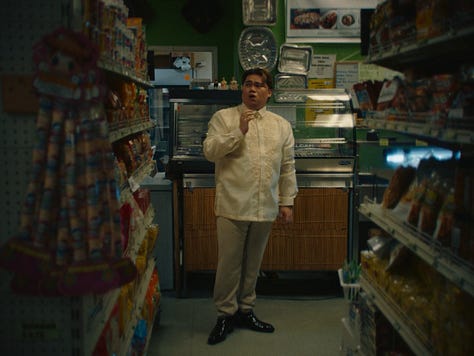


The idea of filming in these spaces is also because we wanted to be able to somehow feature the stories of the folks that own these spaces and that work in them. And that kind of feeds into my original desire to tell a wider array of stories of what it means to be Filipino in Canada and in the broader world.
That experience in itself, getting to meet all of these local business owners and exchange emails with them. And even before that, because I'm not from B.C. so my my reach within the local community is still fairly limited. But I found a lot of these people, not just by cold-calling them or finding them on the internet. But I also relied heavily on the network of Filipino artists and theatre-makers that I know from my other creative work who have grown up here and who know people here. So it's finding all of these community connections that in itself was very soul-filling. That is part of this project. It's not just the song cycle. It's all of that connection.
Ashley Daniel Foot:
I think it really speaks to the very collaborative person that you are because you work in many different milieus in the arts and you bring folks together in a really beautiful way. And I think this project really speaks to the hard work that you've done to build community.
Renee, do you feel pride in being shaped by multiple cultures? And do you think opera has helped or hindered the way that you can see that?
Renee Fajardo:
Yeah, I think of opera now as really just another way to express idea and story and to sing. I love singing. That's how I came to opera in the first place.
To coming to how I fell in love with opera. It wasn't really specifically the repertoire. It's the feeling of belonging that I found when I started learning it because I started learning it with Filipino educators who created this really strong sense of family and connection with the students in their studio. And so it was the first space where I felt really seen. And I felt like, yeah, I could do some pretty awesome stuff. And I'm not a bad singer.
That's the first place that kind of gave me that feeling. And so I think now I'm in this place where the feeling of opera, I don't see opera just as this “it's a Western-Eurocentric art form.” It's not, hasn't been the reality really forever.
Ashley Daniel Foot:
I just wanted to go back to something that we talked about earlier, Renee, and that's that the music in this piece includes echoes of Kundiman, a kind of Filipino love song, and even pop ballads, which I think is so beautiful. What do you think the effect is of layering all of that into a classical piece?
Renee Fajardo:
One, think it sounds really cool. I think if you don't know the songs, it might just be, “that's a very beautiful really grand passage that's taken away from you so quickly.” But if you know the songs, you'll also know some of the history that comes with it. Because a lot of the Kundiman are actually patriotic songs.
So we always talk about them as love songs, but a lot of them were metaphors for love of the motherland, essentially. Using them here is out of the desire of wanting to echo a little bit of that. And then having the layers of like the pop songs, it also, I think, it paints a picture of how the Filipino identity within the diaspora can be fragmented. It can come from so many different influences. It's from our past. It's from our current history, in the present. It's things that we learned from the Americans, both the bad and the good and, all of those things.
I think it feeds into what is our identity now? Which even for Filipinos is a very hard question. To me though, it's like, well, we're a diaspora people. We also have a very potent, very beautiful homeland. We live in both. And I think that's the reality of having all of these kind of fragments of influences and music and things is trying to also encapsulate.
Ashley Daniel Foot:
These Kundiman, do think you could sing a little example of one?
Danlie Rae Acebuque:
Yeah, I mean there's a popular one it's called Sa Ugoy ng Duyan which is like the swing of the hammock and it talks about like yearning for your mom's embrace. The hammock because like you're swaying your arms and it feels like a hammock.
Ashley Daniel Foot:
Beautiful! We're gonna do some rapid fire questions now. What's a Filipino dish that always reminds you of home?
Danlie Rae Acebuque:
Ooh, adobo! Pork adobo. My dad makes the best pork adobo. Everyone says that their household makes the best pork adobo, but my dad's dry, oily pork adobo, sounds not healthy, but it's so good with warm steamed rice.
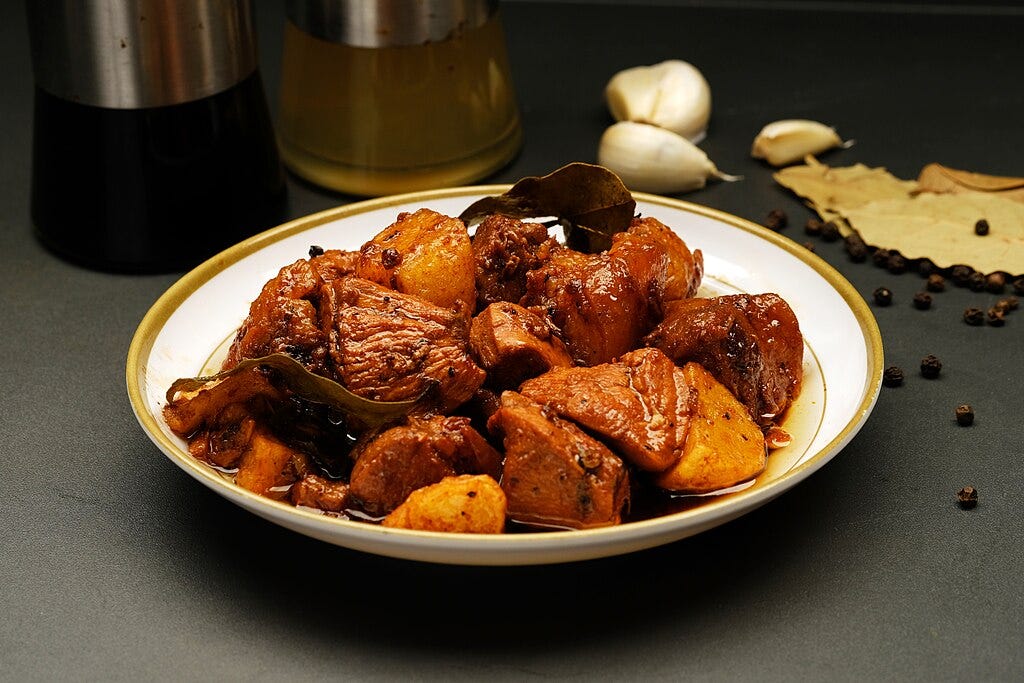
Ashley Daniel Foot:
What about you, Renee?
Renee Fajardo:
Kare Kare! So it's an ox tail stew with peanut sauce and some boiled vegetables. It's the most beautiful dish in the world. It's my comfort food. It's my everything. And I can cook it now!

Ashley Daniel Foot:
Favourite line or image from Liham that gives you chills every time?
Renee Fajardo:
I think the line that goes “My soul is 7,000 islands strong.” Because I think that's the core of Filipino identity.
Danlie Rae Acebuque:
Mine is “They wail like sirens mad as sin, like shadows deep.”
Ashley Daniel Foot:
Tagalog word or phrase you wish more people understood?
Danlie Rae Acebuque:
“Bababa ba?”
Ashley Daniel Foot:
What?!
Danlie Rae Acebuque:
“Bababa ba?” That means “Is it going down?”
And you answer it “Bababa.”
Renee Fajardo:
That’s a good one!
Ashley Daniel Foot:
What about you?
Renee Fajardo:
I think it would be “Utang na loob.”
So “utang na loob,” it's a value. So it's a thing where it's a sense of gratitude that's more visceral. But it can also be something that you say when you're so exasperated and frustrated with someone: “Utang na loob!”
Ashley Daniel Foot:
Opera role you'd like to perform in Tagalog?
Danlie Rae Acebuque:
Gianni Schicchi.
Renee Fajardo:
That's so good!
Ashley Daniel Foot:
What would that sound like?
Danlie Rae Acebuque:
I'm not sure, but I'm pretty sure there's gonna be a lot of Filipino idioms going to be included in that opera.
Ashley Daniel Foot:
How about you?
Renee Fajardo:
Not a role, I have actually heard this, L'elisir d'amore in Tagalog. There is a translation actually, it's back in the Philippines. But it's so funny because it's basically like countryside people, right? And it's the comedy of someone who's a snake oil merchant playing around and trying to fool people. No one's really fooled. Yeah, it's funny!
Ashley Daniel Foot:
What is one place in your home one that you wish that everyone could know about?
Danlie Rae Acebuque:
Ooh, my hometown, Molo, which is a small town sector in Iloilo City, where it has the oldest church, which is the Saint Anne Parish Church, Molo.
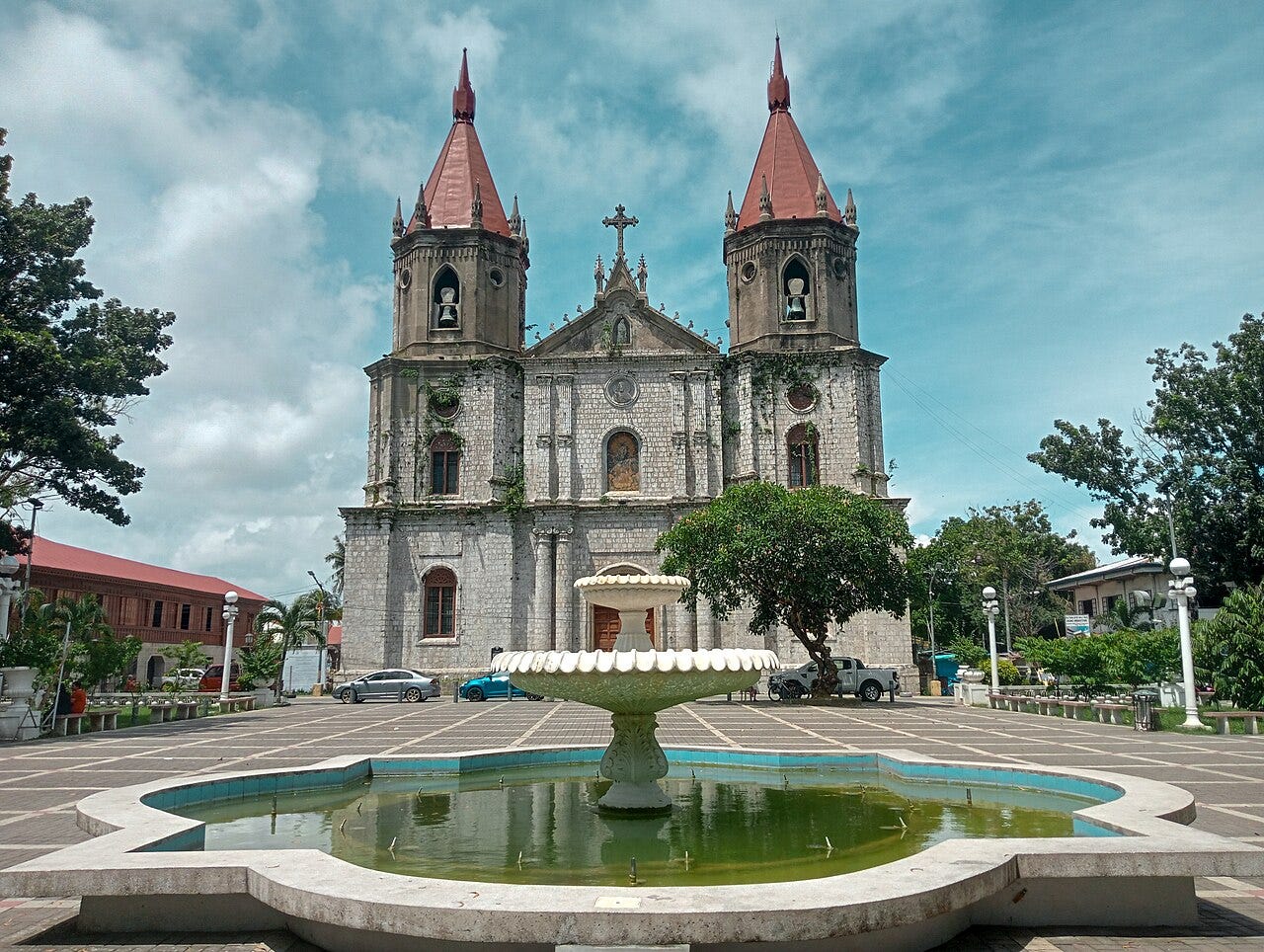
Renee Fajardo:
Manila is chaotic… I think, because I grew up in Manila, but I think if you took time and be very safe and careful to actually go through the streets and not just go to the beaches, I think there's a lot of warmth and hospitality and kindness and also sense of wonder amidst all the grit that you can find.
Ashley Daniel Foot:
Last question, what is your go-to karaoke song?
Renee Fajardo:
If I Ain't Got You by Alicia Keys.
Ashley Daniel Foot:
And you Danlie?
Danlie Rae Acebuque:
My Heart Will Go On by Céline Dion.
Ashley Daniel Foot:
I knew that was coming…
Liham, as you'll have now just discovered, is more than a performance, it's a memory set to music, a protest disguised as poetry, and a love letter to those who live between cultures. It really reminds us that opera isn't just a museum of the past, thankfully. It's a living form, one that can hold the weight of migration, loss, survival, and joy.
As we approach Filipino Heritage Month, I invite all our listeners to experience Liham in full, watch the film to premiere, explore the stories on its companion website, and share it with someone who you might feel should see it.
You'll find all the links in our show notes. And remember, the most powerful art often begins as a letter, addressed not just to the world, but to the parts of ourselves we're still learning to name.
Thanks for listening, and as always thanks to my trusty producer Mack McGillivray, and I'll see you at the opera.
The project premieres at lihamproject.com on June 12, marking Philippine Independence Day and celebrating Philippine Heritage Month.
EPISODE CREDITS
Renee Fajardo - Mezzo-Soprano and Producer, Liham
Born and raised in Manila, Filipino mezzo-soprano Renee Fajardo has performed on both the opera stage and as a solo recitalist in the Philippines, the UK, Europe and Canada. She's currently the education manager at Gateway Theatre and the artistic producer for Sound the Alarm: Music/Theatre. Rene is also a storyteller with The Flame storytelling series and sings with Juno nominated ensemble Musica Intima.
Danlie Rae Acebuque - Baritone, Liham
Danlie Rae Acebuque was the first recipient of the Alexandor Chorney Opera Scholarship at the University of Toronto in 2021. In 2022, he was the recipient of the Stuart Hamilton Memorial Award with Voicebox: Opera in Concert, and in 2023 he was one of the Encouragement Award recipients at the Metropolitan Opera Laffont Competition (Oregon District), and Audiences Choice at the MET (Western Canada District). He is a graduate of the Yulanda M. Faris Young Artists Program at Vancouver Opera.
Ashley Daniel Foot - Host, Inside Vancouver Opera
Ashley is Vancouver Opera’s Director of Engagement and Civic Practice and host of Inside Vancouver Opera. Boundlessly creative and fascinated by the way that art is created and presented, Ashley has guided arts organizations across Canada to craft messages and tell unique stories.
Mack McGillivray - Producer, Inside Vancouver Opera
Mack is a multimedia producer, creating shows for radio and podcast. He is passionate about cultivating local community and a lifelong lover of opera.





